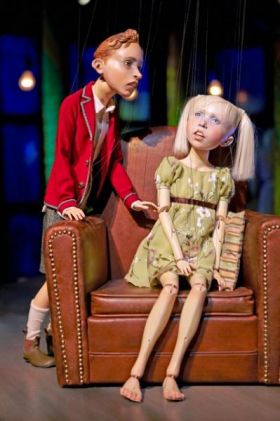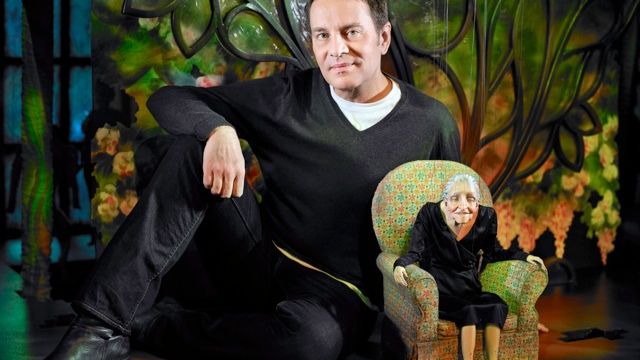Penny Plain
There is no doubt that Ronnie Burkett is astonishingly talented. His marionettes are so convincing that often you forget that they are not flesh and blood actors. Even more amazing is the fact that Burkett manipulates all 15 or 16 of them on his own, acting every role with different voices. It’s a staggering achievement and he holds the audience in thrall. He’s also a very good actor and doesn’t miss a single nuance or subtextual moment or expression.
Penny Plain herself is an old blind woman running a boarding house. She may talk to her boarders but she really only bonds with her dog Geoffrey. But, with Armageddon at hand and the world coming to an end with no hope of reprieve, Geoffrey wants one last chance to go out into the world and become a man, leaving Penny herself friendless. This dark apocalyptic fable is no Punch and Judy show, and it definitely isn’t suitable for children. Despite the cleverly interwoven humour and the glimmer of hope at the end, it is quite disturbing and often uncomfortable as it forces us to face our own mortality and what we might do to survive at any cost. When Penny decides to interview replacements for Geoffrey, we are treated to the comedy of an oversexed chihuahua and a streetwalking poodle, before a young homeless girl, Tuppence, convinces Penny she is a dog and gets a home for the first time in her life. As the world crumbles around them, they cling to each other, reminding us that the true colours of friendship shine brightest through adversity.
 Burkett paints a collage of other interesting characters, all brilliantly realised as marionettes: There’s Evelyn French, a woman who so desperately wants a child that she asks a puppetmaker to make her one; a serial killer who follows people who make a noise on the train and kills them; a transvestite bank teller who now has nothing to lose by indulging his fetish; an American couple who thoroughly deserve to be bricked up in the cellar; a vicious old woman with a zimmer frame who is demanding and soul destroying, and the puppetmaker who turns out to be Gepetto…the creator of Pinocchio. Add to this score of offstage voices providing news reports into the end of the world, music and songs, and you begin to realise what an incredibly complex production this is and why there are bound to be flaws, even though they cannot truly diminish the scope and ambition of this event.
Burkett paints a collage of other interesting characters, all brilliantly realised as marionettes: There’s Evelyn French, a woman who so desperately wants a child that she asks a puppetmaker to make her one; a serial killer who follows people who make a noise on the train and kills them; a transvestite bank teller who now has nothing to lose by indulging his fetish; an American couple who thoroughly deserve to be bricked up in the cellar; a vicious old woman with a zimmer frame who is demanding and soul destroying, and the puppetmaker who turns out to be Gepetto…the creator of Pinocchio. Add to this score of offstage voices providing news reports into the end of the world, music and songs, and you begin to realise what an incredibly complex production this is and why there are bound to be flaws, even though they cannot truly diminish the scope and ambition of this event.
The script, as is almost always the case, is the most at fault. It wanders and loses its focus quite often and works best when it centres on the journey of Penny Plain and Tuppence and how, or even if, they will survive. The American couple, a funny and garish creation, are a diversion but nothing more, and there are several such diversions…the return of Pinocchio as a full grown man, Pino, only to disappear again after one scene when there was scope to develop a relationship between him and Evelyn. It seems sometimes that Burkett (as writer) loses interest in his characters and moves on quickly to something/someone else. At one hour and forty-five minutes long (no interval) it would be easy to cut some twenty minutes and have a tighter and more satisfying narrative thread. But this is minor criticism amongst the praise. Kevin Humphrey’s lighting design is astonishing; likewise John Alcorn’s original music and the sound design. The puppets and the set itself are quite wonderful and they are also the work of Burkett and his puppet studio. It’s hardly surprising that Burkett has won every conceivable award for his puppet plays, and this is his twelfth production. The thirteenth opened only two months ago, so Burkett is not only brilliant, he’s prolific. This is very different, thought provoking theatre, and you won’t be disappointed.
Coral Drouyn

Subscribe to our E-Newsletter, buy our latest print edition or find a Performing Arts book at Book Nook.

